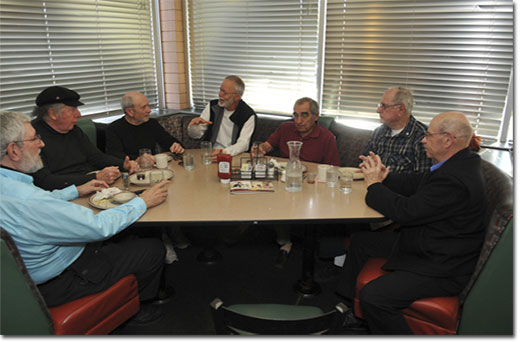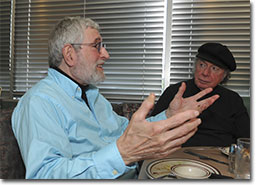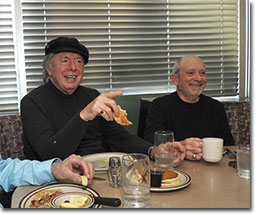
|
|
IN THE MEDIA
Man to Man Helps Men Whose Partners Have Breast Cancer By Vicki Larson But that hasn't stopped the San Anselmo resident from heading to Denny's in Corte Madera every Wednesday morning to be present and available for men whose partners are dealing with challenges he knows all too well. "Men play the macho game all the time. They think they can fix everything. Breast cancer is not something they can fix, and the emotional impact both on the partner and the male is also something that's not that fixable," says Weingarten of the need for Man to Man, a drop-in men's support group now in its 20th year. The group gave the retired journalist a safe place to unload his emotions as well as learn from others. It's still doing that today. There's no agenda, no dues, no requirements, no facilitator. Just men helping men. Members talk about whatever's on their mind, from issues related to their partner's cancer to everything but that. Still, when a new member arrives, the men gear the meetings toward whatever questions he has and whatever kind of support he needs.
The members have lived through it all standing by their partner — lumpectomies, mastectomies, radiation, chemo, hair loss. Some men show up when their partners are first diagnosed. Some come even though their partners survived cancer years ago. Some come while their partners are dying. Some come after a partner's death.
While it originally was just available for men whose partners had breast cancer, it's expanded to include men whose partners have any kind of cancer as well as men who have breast cancer themselves. "The fellows are really great to talk to. They're very open," Bourguignon, 71, a retired professor, says. "It's kind of nice to have a group of guys you feel comfortable with." For Donald Violin, who joined a little more than four weeks ago when his wife underwent a lumpectomy, the group is easing some of his fears beyond the help he and his wife get through their surgeon. He doesn't feel so alone. "I was apprehensive, concerned, and I didn't know what was going to happen," says the 80-year-old Novato resident. "All of the men have had the same experience. It's a little different talking to somebody who's treating people opposed to someone who's experienced the problem. That's why I feel this is a really good organization." It's often the wives who nudge their husbands into attending the group; that's what got Weingarten and Marv Edelstein, one of Man to Man's original members, to go years ago. While the members may not be as up to speed on the latest treatments anymore, there are some things that never change, like a need to know what to expect, Edelstein, 71, notes. "The medicine changes, but the mental aspect and frustrations of trying to keep your wife happy and help her but not cross the line and being annoying can be kind of tricky," the San Rafael resident says. "There are so many things that individuals think, 'What's wrong with my wife?' and you talk to a bunch of guys and four out of five had the same experience. It's not just your wife." Although men can find lots of breast cancer information on websites and in online chat rooms, people can hide the truth behind the anonymity, Weingarten believes. Nothing beats sitting down with other men who know what a man's going through. "You're looking in somebody's eyes and you know what they're feeling and saying," he says "and you know if there's a disconnect or not." Vicki Larson can be reached at vlarson@marinij.com; follow her on Twitter at @OMGchronicles, fan her on Facebook at Vicki-Larson-OMG-Chronicles.
Spouses of Breast Cancer Survivors
find a Safe By Beth Ashley WHEN WOODY Weingarten of San Anselmo learned that his wife had breast cancer, he was terrified. "I was scared out of my mind," he says. "I was afraid she would die." But he didn't discuss his fears with wife Nancy Fox, preoccupied with her own emotional battles. "He kept everything to himself," she says, "and I needed him to do that. I was the deal. I needed the focus to be on me." Weingarten, nevertheless, was in dire need of support, and a place to express his terror. He found it in Man to Man, a support group for men whose partners have breast cancer. "Most men have difficulty admitting to their need," he says. "Most men are afraid to be open enough to share their difficulties, share their problems, share their inability to cope." But Weingarten jumped at the chance. "In a crisis I usually take charge. In my work life" -- he's managing editor of the Jewish Bulletin of Northern California -- "I've been a boss since I was 21. But breast cancer was a whole new experience. I couldn't fix it. I couldn't play macho man." Eight years ago, when Fox was under treatment, he showed up for a session of Man to Man. He has been attending ever since. Although his need for support has receded with time, his attendance "is part of what I consider 'giving back.' I want to be there for people who have the same needs I had. Your needs don't end, just because your partner is 'cured.' I was still receiving long after the treatments, long after we felt that Nancy was OK." Man to Man, which meets every week for breakfast, is open to men of all ages whose partners are at any stage of the breast cancer process. Some men come although their wives had cancer years ago. Some came though their wives were dying. The group was a lifesaver for Weingarten, because it allowed him to vent his anxiety, to bond with man in the same boat, to learn about treatments and their side effects, and to share tales of unfeeling or ignorant medical practitioners. "We could talk about anything," he says, "and we did." Fox, who composed music for children and
health organizations for years before practicing public relations
in San Francisco, discovered her own cancer in 1994 during a
routine Seven years after her last treatment, Fox says she is healthy. But "the cancer is always with me. I wake up in the middle of the night and ask Woody to hold me." Every check-up brings renewed terrors. Both she and Weingarten kept journals of their experience, and he has used the material for a book, "Roller Coaster," named for the up-and-down cycles of hope, panic, uncertainty and despair. He is looking for a publisher -- both for his book and for the musical revue, "Touching Up The Gray," a comedy about dealing with mid-life that he and Fox wrote together as "part of the healing process." His book deals with breast cancer from the male point of view. "There are 350 books out there about breast cancer, and 349 are from the female perspective." Research from the National Institutes of Health "is all about the women" he says. "Men feel isolated, frustrated, they don't know where to turn." And despite heartening stories from others, Weingarten says the experience of breast cancer is "a bitch." The Man to Man group "gave me a safe place where I could talk about my difficulties, my questions, my ignorance. It was a place where I could be completely vulnerable and know there would be others there who would understand." Begun 10 years ago by Marinite Bill Bowersock, who later moved to Nevada, the group met "on call" for several years, but Weingarten says "enough people were getting great benefits from it that it became weekly." The men meet Wednesdays at 7:15 a.m. at Denny's in Corte Madera. "A lot of wonderful friendships have been formed," says Fox. Recently she and Weingarten entertained the male members and their wives: "It was a good time. There was a lot of laughter." At breakfast meetings, Weingarten says, "we discuss everything - the Super Bowl, car engines, our children, the economy." But if one of the wives has a setback, the talk turns to coping with breast cancer. "If a new person comes in," says member Dan Goltz, "we just let him talk. He tells us what he''s going through, and we've all been through it, too." Goltz, a San Anselmo architect, joined five years ago when his wife Carol was diagnosed, and says he gained enormous comfort from it. "I realized (from Weingarten) that Nancy was still alive, and that made me feel there's really a lot of hope. I stopped planning the funeral." Marv Edelstein of San Rafael was one of Man to Man's original members, and says when his wife Maria was stricken, the group was invaluable as a place where he could express his fear or anger or frustration. "I needed to talk to other guys. I needed to know what would happen next." Ten years ago, he says, "there were so many unknowns. You find yourself in a situation you never thought would happen to you. It helps to talk. It makes it a lot easier." While the wives of many current members had their cancers several years ago, Edelstein encourages men whose wives are now in treatment to show up at the meetings of the group. Fox says she remains grateful for the help it gave her husband."When Woody was taking care of me, he couldn't tell me what he was going through. But I was thrilled that he had support of his own," she says. Weingarten and Fox say the cancer experience changed their lives. They learned to live in the moment, to appreciate the joys of each day. When irritations arise now, they say to each other, like a mantra, "but at least it isn't cancer." Fox feels that Man to Man gave her husband the strength to be there for her. For his devotion, Fox nominated him for an "Honor Thy Healer" award from Breast Cancer Watch. "I don't know how women do it alone. I am so grateful that I have had a partner," Fox says. Weingarten feels he has gained, too. The group helped him develop closer relationships with other men, and "to use every moment and every opportunity to develop that closeness with Nancy." "My life wasn't threatened, but my universe was." INFORMATION For more information about Man to Man, a drop-in support group for men whose partners have breast cancer, call Woody Weingarten at 459-3434, or Marv Edelstein at 457-4479. Reprinted from the Feb. 10, 2003 IJ by permission of the Marin Independent Journal. |
||||||||||||||||||
|
In the Media | Marin Links | Related Book |
|||||||||||||||||||


 IJ Senior Feature Writer
IJ Senior Feature Writer self-check in the shower. Doctors performed
a lumpectomy, and she underwent three months of chemotherapy
and 35 sessions of radiation thereafter, supplemented by eastern
medicine at the Pine Street Clinic in San Anselmo and visualization
therapy at Marin General Hospital with Leslie Davenport.
self-check in the shower. Doctors performed
a lumpectomy, and she underwent three months of chemotherapy
and 35 sessions of radiation thereafter, supplemented by eastern
medicine at the Pine Street Clinic in San Anselmo and visualization
therapy at Marin General Hospital with Leslie Davenport.